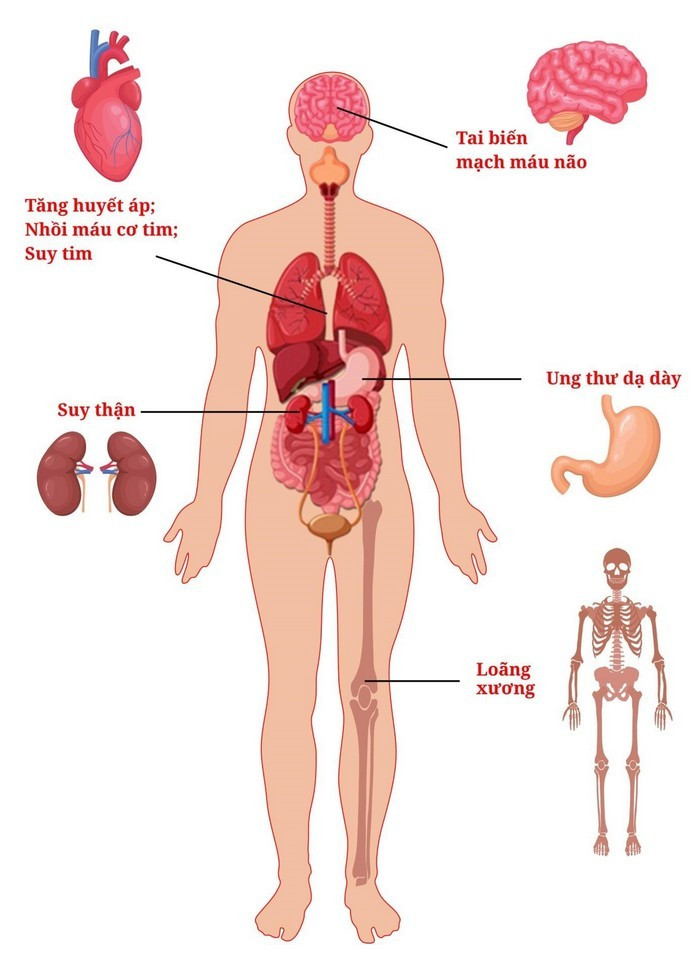Salt - a double-edged sword?
Whether you eat vegetarian or non-vegetarian, salt is present in it. Although necessary, salt is still a “double-edged sword” because lack or excess can be harmful to health.
Important role
The main ingredient of table salt is sodium chloride (NaCl), of which sodium accounts for up to 40%. In addition, table salt also contains a number of other trace elements.
Physically, table salt is a crystalline solid, white or pale gray in color, sometimes with pink streaks. The supply of table salt comes from evaporated seawater or from naturally formed salt mines around the world.
Salt plays an important role in the survival of all animals, because sodium participates in life activities at the cellular level, providing energy and electrical impulses for the brain and nerves to function. At the same time, it participates in regulating the amount of water contained in the blood vessels and in the cells.
In everyday life, it is hard to imagine dishes being prepared without salt. Without salt, dishes would be bland and tasteless. Before refrigeration, salt was the only food preservative due to its antiseptic properties.
Although salt plays an important role, any deficiency or excess of it in the body brings unpredictable health consequences to humans, so it is necessary to strictly regulate the intake and output.
According to the recommendations of the World Health Organization (WHO/OMS), the average daily salt requirement of an adult is about 5 grams (equivalent to 2,000 grams of sodium), children under 1 year old is 1 gram, children 1-3 years old is 3 grams, children 7 years old and older is the maximum equal to that of an adult.
People with kidney and cardiovascular diseases need to reduce their daily salt intake. In Vietnam, according to a 2015 survey, an adult consumes an average of 3,760 mg of sodium per day - equivalent to 9.4 grams of salt. This amount is nearly twice as much as the recommendation of the World Health Organization.
From sodium deficiency…
When the amount of salt consumed is not met according to the need, meaning the body lacks salt or in other words lacks sodium, it will cause the following diseases:
- Edema: Mild cases have edema of the limbs, severe cases have edema of the whole body due to lack of sodium, causing water to escape into the interstitial spaces.
- Cerebral edema: The body's lack of salt causes a lack of sodium, creating a phenomenon of cell osmotic pressure imbalance, the area inside the cell (intracellular) is lower than the area outside the cell (extracellular), causing water to rush from the outside into the cell, causing cerebral edema...
This is the most dangerous side effect of eating too little salt. Common symptoms in people with cerebral edema include: fatigue, drowsiness, loss of appetite, impaired consciousness, convulsions and coma.
- Reduced muscle function: Muscle aches, tingling, cramps and possibly muscle paralysis in very severe cases.
- Electrolyte deficiency: Salt deficiency causes a lack of sodium in secretions such as saliva, sweat, and urine. At the same time, it causes metabolic disorders and reduces blood circulation volume.
- Hypotension: Due to decreased blood sodium, osmotic pressure in the blood vessels decreases, causing low blood pressure and making the body always feel tired and exhausted. Due to decreased circulating volume, organs lack nutrients and oxygen necessary for cell activity.

…to “import surplus”
Excess salt intake, or "excess sodium" entering the digestive tract, also causes many other diseases and disorders in the body, such as:
- Hypertension: Is a burden of disease for families and society. The disease tends to be younger and younger. Hypertension is the leading risk factor for cardiovascular events and stroke.
- Obesity: Especially in children. Salt always makes people feel thirsty so they tend to drink a lot of sugary soft drinks.
- Osteoporosis: Excess sodium will limit the amount of potassium, calcium and many other trace elements in the blood. This will cause metabolic disorders and reduce bone density and strength, causing osteoporosis.
- Digestive tract diseases: Excess sodium increases the risk of gastric and duodenal ulcers, increasing the rate of stomach cancer by up to 68%, because it breaks down the protective mucosal layer, creating conditions for Helicobacter pylori bacteria to grow.
- Kidney failure: Increased sodium increases the burden on the kidneys, as they have to increase excretion. Long-term hard work causes kidney function to decline and eventually kidney failure.
In addition, eating too much salt also has adverse effects on brain function (cognitive decline, memory), aggravates asthma, and causes hearing disorders - because it increases fluid retention in the inner ear and can cause deafness.
Although salt, especially the sodium contained in salt, is essential and related to the survival of the body, lack or excess of salt can cause many disadvantages to health. Therefore, using the amount of salt recommended by the World Health Organization must always be paid attention to. Any suspicion of related diseases should be examined and adjusted as soon as possible according to the advice of experts.


